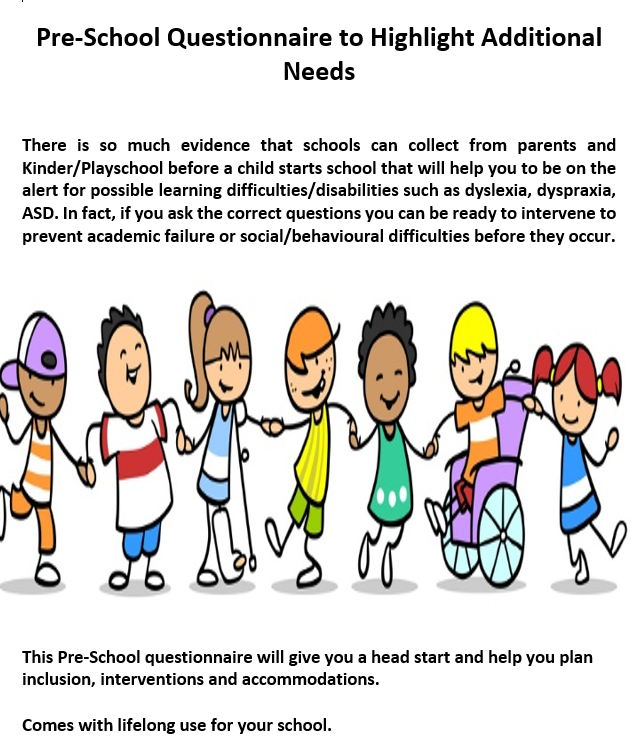Pre-School Questionnaire to Identify Students with SEN

Pre-School Questionnaire to Identify Students with Additional needs
Lifelong use for your school for just $10
There is so much evidence that schools can collect from parents and Kinder/Playschool before a child starts school that will help you to be on the alert for possible learning difficulties/disabilities such as dyslexia, dyspraxia, ASD.
In fact, if you ask the correct questions you can be ready to intervene to prevent academic failure or social/behavioural difficulties before they occur. For example, much research suggests that Specific Learning Difficulties (SpLD) such as dyslexia are mainly genetic and therefore it is important to find out family incidence. Many children who were slow to speak or required speech therapy early on, are later diagnosed with a language or reading disorder.
Approximately 30% of children with early language or speech problems go on to develop dyslexia.
Family Risk: in family risk studies, children are followed who are at risk of dyslexia by virtue of having an immediate dyslexic family member (usually a parent). Such studies have shown that 34–66% of them develop dyslexia (Scarborough, 1990; Elbro et al., 1998; Pennington and Lefly, 2001; Snowling et al., 2003; Torppa et al., 2010).
Estimates for the heritability of reading ability are in the range of 0.47–0.84 (Taylor et al., 2010; Byrne et al., 2009, respectively).
Price $10
What should we be asking parents?
To be on the alert for possible reading difficulties/dyslexia the following information can include; difficulty learning nursery rhymes, slow to talk, pronunciation difficulties, speech therapy on the advice of their kinder teacher.
Inability to stay still, constantly bumping into objects and falling over, difficulty riding a bike, using a knife and fork, avoidance of construction toys, rejection by peers, preferring adult company may indicate dyspraxia.
Although not a disorder, children who had persistent ear infections, gromets fitted may have difficulty with similar sounds affecting reading and ability to follow instructions.
The following questionnaire is intended for schools to use with parents of all new children. It will, however, help teachers highlight those children who may require support and intervention. It might also be used with other data to help schools group children and place in classes.
The questionnaire can be changed to have the school’s name and Logo. Additional questions can be added or others extracted. The school has lifelong use of the questionnaire
To see our range of resources or to find out about professional development for teachers, class aides, support officers and parents go to: www.dyslexiasupportservices.com.au